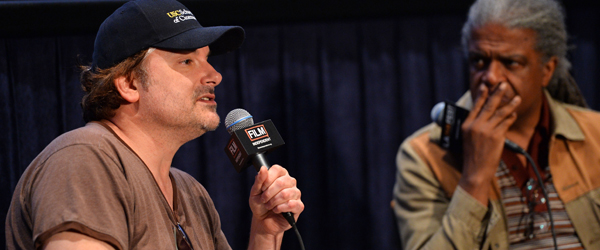“Surround yourself with like-minded people… You can help each other, as what happened with me. Talent obviates the odds. Talent changes everything.” Iron Man 3 director Shane Black on getting started in Hollywood at this year’s Coffee Talks: Director. By Pamela Ezell / LA Film Fest Guest Blogger Shane Black sat down to a packed house with critic and curator of Film Independent at LACMA Elvis Mitchell for one of the Los Angeles Film Festival’s annual traditions, Coffee Talk: Directors. Black is both a successful writer (Lethal Weapon, The Last Boy Scout) and director (Kiss Kiss Bang Bang, Iron Man 3), and he and Mitchell had a relaxed conversation about his approach to filmmaking. After such a long career as a writer, Mitchell asked Black if he’d always wanted to direct? “Not really,” Black laughed. “It was a lame ambition, but the writing didn’t satisfy. I thought most of the films that were made from the scripts I’d written did a pretty good job – not a great job. And I would recut the film in my head.” “My first day as a director was kind of problematic. I laid it all out, the actors brought it, there was great footage. I didn’t do anything. It was too easy. On a good day, it’s like having a party and the police are standing at the door. Actors are best when they can play,” Black said. “I’ve been lucky, I’ve never gotten a turkey. I’ve been lucky to have actors who don’t need a lot of prompting. Casting is everything.”
Speaking of Casting…
Robert Downey, Jr. has appeared in both films Black has directed, so he was a frequent topic of conversation. “There’s an enormous amount of hurt in Robert Downey, Jr.,” Mitchell said. Black said that when he first met Downey, “There were no buffers between you and the man’s soul. That’s so powerful. That’s what attracted me to Robert. When it comes to a character,” Black continued, “what is the thing they’re covering up? What are they afraid of? Downey has the swagger and the scared kid – that’s golden.” An audience member asked how much collaboration Downey and Black enjoyed during the making of Iron Man 3. Black answered, “Some of the best lines were written an hour before they were shot. He had great suggestions. You can’t do that with everyone. We had a degree of trust having worked together before.” Another audience member asked about working with Samuel L. Jackson. “Sam Jackson believes the text is there to bring to light. If he didn’t like the character, he wouldn’t do the movie. He is one of the most friendly, cooperative people I’ve ever worked with.”
Banter and Subtext
“Spot on is not the most interesting storytelling. Think about Butch Cassidy and the Sundance Kid. They’re coughing up blood and they’re bantering. They’re playing the subtext of that scene, not the bantering,” Black explained. “People think there’s a formula for people having banter – try telling that to Howard Hawks in His Girl Friday. The movies where people talk baldly – on the nose – it’s boring.” “I was a lonely kid,” said Black. “You probably were, too,” he said to Mitchell. “You’re a film buff. I listened to comedy albums. George Carlin, David Steinberg, Richard Pryor. I worked with comedians later and I learned banter from them.”
Movie Themes and Inspirations
When Mitchell asked what Black considered his favorite films and inspiration, over the course of the conversation, Black again mentioned Howard Hawks, the first Dirty Harry, Lost in America, Kramer vs. Kramer and Jaws. He said his early role model was his brother, Terry, who wrote paperback Westerns. “In a lot of your films, you deal with resurrection,” Mitchell said. “Why is that?” “There’s a spiritual resurrection waiting to happen in all of us. We want to be moved. We want a profound experience at the movies. Horror movies are a rehearsal for the death that will one day be our own. If you put real characters in a real situation and then they escape – that’s a catharsis.”
What’s Wrong with Action Films Today
Despite his success in the action genre, Black is no fan of CGI. “In these big movies now, the character stops for the action.” Black explained that when the special effects take over the narrative, the actor isn’t there. Then the action sequence ends and the actor is back. “CGI has to feel visceral, combining as much real footage as possible. On Iron Man 3, we only replaced stuff if we had to.”
On Breaking into the Business
“Surround yourself with like-minded people,” Black told the audience member who asked him about starting a career. “It’s a leaky boat being a screenwriter in Hollywood. You can help each other, as what happened with me. Talent obviates the odds. Talent changes everything.” Whether he was leveling with the audience or kidding with them, near the end of the conversation, he said, “Most of you don’t have talent. Get yourself a writers’ group – form one. Pass the pages back and forth and give freely of what you have. You’ll be able to help each other up the rungs. I envy you – with that hunger.”
